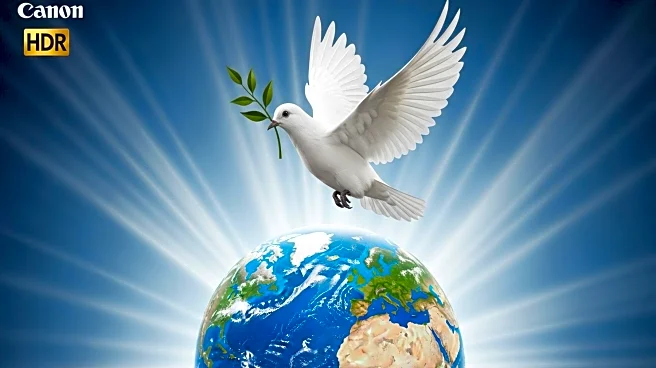What is the story about?
What's Happening?
President Trump has unveiled a 20-point peace plan aimed at ending the ongoing conflict in Gaza. The plan, presented during a meeting with Israeli Prime Minister Benjamin Netanyahu, outlines a framework for dialogue between Israel and Palestine. Key elements include the release of Israeli captives within 72 hours of Israel's acceptance of the agreement, followed by the release of Palestinian prisoners. The plan stipulates that Israel will not occupy or annex Gaza, and no residents will be forced to leave. A significant aspect of the proposal is the establishment of a 'Board of Peace,' chaired by President Trump and former British Prime Minister Tony Blair, to oversee a technocratic administration in Gaza. The plan also calls for an international stability force, likely composed of neighboring Muslim states, to ensure peace and stability in the region.
Why It's Important?
The proposed plan represents a significant shift in U.S. policy towards the Israeli-Palestinian conflict, potentially paving the way for the establishment of a Palestinian state. The involvement of international figures and organizations, such as the United Nations and neighboring Muslim states, underscores the global dimension of the peace efforts. The plan's success could lead to a reduction in regional tensions and foster economic and social stability in Gaza. However, the plan's acceptance hinges on the willingness of Hamas and other stakeholders to agree to its terms. The proposal also highlights the strategic role of Qatar in mediating negotiations, reflecting its influence in the region.
What's Next?
The next steps involve securing agreement from all parties involved, particularly Hamas, which has yet to receive the written plan. The U.S. and its allies, including Qatar, will likely intensify diplomatic efforts to persuade Hamas to accept the proposal. Should the plan be accepted, the focus will shift to implementing the outlined measures, including the release of captives and the establishment of the international stability force. The plan's success will depend on the cooperation of regional players and the ability to address any discrepancies between the written plan and the positions of key stakeholders like Netanyahu.
Beyond the Headlines
The plan's emphasis on international oversight and the potential for a Palestinian state marks a departure from previous unilateral approaches. It raises questions about the future role of the Palestinian Authority and the long-term governance of Gaza. The proposal also highlights the complex interplay of regional politics, with Qatar's involvement reflecting broader geopolitical dynamics. The plan's success could redefine U.S. influence in the Middle East and set a precedent for resolving other protracted conflicts.















